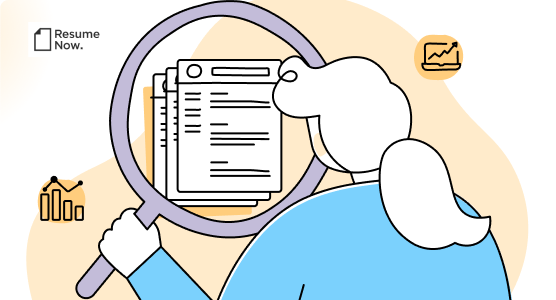Popular Entry-Level Resume Examples
Entry-level tech resume
An entry-level resume for a tech role should focus on relevant skills, education, internships, and volunteer work to demonstrate capability and enthusiasm despite limited professional experience.
Focuses on goals: The job seeker demonstrates a proactive approach to their entry-level position by emphasizing achievements in tech support and system optimization, showcasing their commitment to continuous learning and user satisfaction enhancement.
Showcases education: This resume builds the candidate’s credibility by placing a strong focus on their educational background, establishing their expertise despite limited experience.
Entry-level student resume
An entry-level resume for a current student should showcase academic achievements, transferable skills, and eagerness to grow and develop further skills.
Begins with a resume objective: This resume opens with a goals-based resume objective that reflects the candidate's dedication to learning and development.
Balances skills and experience: This job seeker's resume effectively highlights their volunteer experience alongside relevant math skills.
Entry-level internship resume
An entry-level resume for an internship should showcase the candidate's preparedness for the workforce by focusing on relevant skills, education, and achievements.
Focuses on relevant skills: Even though she lacks industry experience, this applicant's resume reflects concrete and actionable marketing skills that will help her thrive at her next internship role.
Uses a neat template: This template is neatly organized and presents the candidate's skills in clear and simple terms that employers can understand at a glance.
More resume examples
Additional Guides
- Amazon
- Analyst
- Architecture
- Art
- Artist
- Arts
- Aviation
- Banking
- Billing
- Biology
- Biotech
- Budtender
- Business
- Business Operations
- Cashier
- Chef
- Chemical Engineering
- Chemistry
- Child Care
- Civil Engineering
- College
- College Graduate
- Communications
- Compliance
- Computer
- Computer Hardware
- Computer Science
- Computer Software
- Construction
- Consultant
- Cook
- Copywriting
- Cosmetology
- Culinary
- Customer Service
- Customer Success Manager
- Cyber Security
- Data Systems Administration
- Dentistry
- Driving
- ECommerce
- Education
- Electrical
- Electrical Engineering
- Engineering
- Entertainment
- Environmental
- Esthetician
- Event Planning
- Executive
- Fashion
- Federal
- Film
- Finance
- Firefighter
- Fitness & Nutrition
- Food Service
- Government
- Graphic Designer
- Handyman
- Healthcare Support
- High School Student
- Hospitality
- Human Resources
- Industrial Engineering
- Insurance
- Interior Design
- Internship
- Inventory Management
- IT
- Janitorial
- Law
- Law Enforcement
- Legal
- Library Museum
- Logistics
- Maintenance
- Manager
- Marketing
- Mechanical Engineering
- Medical
- Mental Health
- Metal Work
- Military
- Music
- Nursing
- Performing Arts
- Pest Control
- Pharmacy Technician
- Photographer
- Physical Therapy
- Pilot
- Plumbing
- Product Manager
- Product Owner
- Production
- Production Assistant
- Program Manager
- Project Manager
- Psychology
- Purchasing
- Quality Control
- Radiologic Technologist
- Real Estate
- Restaurant Manager
- Retail
- Safety Security
- Sales
- Sales Associate
- Scholarship
- Sciences
- Server
- Shipping
- Skilled Trades
- Social Services
- Software Engineer
- Special Education
- Sports
- Statistics
- Stay At Home Mom
- Student
- Supervisor
- Teacher
- Teen
- Training Development
- Transportation
- Travel
- Ux Designer
- Veterinary
- Virtual Assistant
- Waitress
- Web Development
Entry-Level Resume Template
Looking for a way to kickstart your career? This entry-level resume template provides a solid base—just personalize it with your details to make it uniquely yours.
Constance Woods
Los Angeles, CA 90001
(555) 555-5555 | Constance.Woods@example.com
Resume Objective
Detail-oriented marketing student seeking a Marketing Intern position to leverage skills in social media management, event planning, and digital marketing while gaining hands-on experience in the marketing field.
Education
Springfield University — Springfield, IL
Bachelor of Business Administration
Maintained a 3.5 GPA while volunteering 10+ hours per week
Skills
- Social Media Management
- Content Creation
- Event Planning
- Digital Marketing
- Marketing Research
- Interpersonal Communication
- Team Collaboration
- Creative Thinking
Volunteer Experience
Student Government Association — Marketing Volunteer
September 2024 to December 2025
Los Angeles, CA
- Coordinated marketing campaigns for student events
- Increased event attendance by 30% through targeted social media promotion
- Designed posters and flyers for campus activities
Local Food Bank — Social Media Coordinator
Long Beach, CA
May 2024 to August 2024
- Created engaging content for social media platforms
- Boosted follower engagement by 25% within three months
- Assisted in organizing food drives and community outreach initiatives
Springfield Animal Shelter — Event Organizer
Santa Monica, CA
September 2023 to April 2024
- Planned fundraising events, raising $2,000 for the shelter
- Collaborated with local businesses to secure sponsorships
- Promoted events through email newsletters and printed materials
Accomplishments
- Raised $2,000 for local charities through community events
- Increased social media engagement by 30% in one semester
- Successfully balanced academics and volunteer leadership responsibilities
Writing Your Entry-Level Resume
Having explored these effective resume examples, you are now prepared to dive into how to write a resume for your first job. We will walk you through each section step by step, ensuring you create a standout document.
List your most relevant skills
Entry-level candidates should pay extra close attention to their skills section. Without experience, it's more vital than ever that you highlight your strengths by including both technical abilities and soft skills like teamwork and adaptability.
Incorporate keywords from the job listing into your skills section. Doing so helps capture the attention of human recruiters while also ensuring that applicant tracking systems recognize your application as relevant and qualified. Tailoring this section demonstrates your understanding of the role's demands and readiness to meet them.
Example of skills on an entry-level resume
- Adept at managing multiple tasks while maintaining attention to detail
- Strong communicator with the ability to collaborate across teams
- Enthusiastic learner with a passion for continuous improvement
A strong skills section showcases both hard and soft skills, proving the job seeker is equipped to tackle technical tasks while also effectively navigating workplace dynamics and collaborating with others. This balance is essential for any entry-level role.
Highlight your work history
The work experience section of an entry-level resume might seem like a contradiction, but even without experience, you can still showcase your skills in action. Use volunteer positions and extracurriculars to fill out this section.
Make sure to choose relevant experiences that showcase the skills required by the role. This is a good place to weave in some keywords and transferable skills to wow employers.
Example of an entry-level work experience entry
- Student Teacher's Assistant
Alamo High School - San Antonio, TX
September 2025 - Present - Support classroom instruction for multiple class periods by assisting teachers with lesson delivery, materials preparation, and student supervision
- Provide one-on-one and small-group academic support to students, reinforcing lesson concepts and improving comprehension
- Assist in managing classroom behavior by monitoring student engagement and maintaining a positive, structured learning environment
- Organize instructional materials, assignments, and classroom resources to ensure smooth daily operations
Aim for clarity in your resume bullet points. Provide enough detail to showcase your accomplishments, but keep it concise so hiring managers can quickly grasp your skills and impact.
Turning school and life experience into job skills
Starting your career can feel daunting, especially when applying for entry-level positions. Remember, your education and any projects you’ve participated in can effectively showcase your relevant skills. Think about the coursework you've completed or any academic projects that required teamwork, research, or problem-solving—these experiences highlight your potential to employers.
Next, look for transferable skills from your non-work experiences. Volunteering, group assignments, and even personal projects can demonstrate abilities like communication, leadership, and organization. For example, if you organized a community event or led a study group, these activities are valuable proof of your capabilities.
Key areas to mine for transferable skills
- Academic projects: Research papers, presentations, group projects, lab work
- Leadership positions: Club officer, team captain, project leader, event organizer
- Volunteer work: Community service, nonprofit assistance, mentoring
- Internships or part-time work: Even brief experiences in professional settings
- Personal projects: Blogs, websites, creative work, self-directed learning
- Sports or performing arts: Teamwork, discipline, performing under pressure
Include your education
The education section of your entry-level resume should list your academic achievements in reverse-chronological order, starting with the most recent degree or diploma. Include all relevant degrees and certifications that apply to the job you are pursuing, but feel free to omit a high school diploma if you have already obtained a bachelor's degree or equivalent.
If you are currently completing a degree or certification, include the highest level of completed education along with an anticipated graduation date. Highlighting relevant coursework or notable achievements through bullet points can be particularly useful for current students or recent graduates who may not yet have extensive work experience.
Common certifications for an entry-level resume
- Google Career Certificates (Foundations, IT Support, Data Analytics)
- Microsoft Office Specialist (Word, Excel, PowerPoint)
- LinkedIn Learning Certificates
- Coursera Professional Certificate
Sum up your resume with an introduction
Creating a compelling profile section on your resume is important for making a strong first impression. This section serves as your introduction, giving potential employers a snapshot of who you are and what you bring to the table.
For experienced job seekers, using a professional summary is often the best approach because it allows you to showcase your key accomplishments and relevant experience right at the top of your resume. For entry-level candidates, however, a goals-focused resume objective is usually more appropriate.
Professional summary example
Dedicated retail professional with a strong foundation in customer service and communication skills. Eager to contribute to team success through effective collaboration and problem-solving abilities. Proficient in using various software applications to improve operational efficiency and improve client interactions.
Resume objective example
Enthusiastic project management intern eager to apply strong communication, problem-solving, and teamwork skills in a collaborative environment. Aiming to contribute fresh ideas and a positive attitude to improve project success and drive organizational growth.
When building a resume profile for an entry-level position, focus on integrating relevant keywords from the job description. This section is your first chance to showcase your qualifications and align with what employers are seeking. By doing this, you improve your chances of passing through applicant tracking systems (ATS) and getting noticed by hiring managers.
Add unique sections to set you apart
Incorporating optional resume sections can help you showcase your unique qualifications for entry-level positions. These sections allow you to highlight skills and experiences that may not fit into the traditional format.
By adding details about relevant hobbies or volunteer work, you provide potential employers with a fuller picture of who you are as an applicant. This can demonstrate your commitment to personal growth and your alignment with their values. Sharing these aspects reveals transferable skills and shows how you spend your time outside of work, making a strong case for your candidacy, despite limited experience.
Three sections perfect for a entry level resume
- Relevant Coursework: When you have limited work experience, highlighting relevant academic coursework on your resume can showcase your skills effectively. Include 3-4 courses that align with the job’s requirements, emphasizing the practical knowledge you've gained and how it applies to the role.
- Academic Projects: Including projects on your resume can effectively highlight your foundational knowledge. Focus on classes that align with the job you're applying for to demonstrate your preparedness and commitment to the field.
- Hobbies and Interests: Including hobbies and interests on your resume can improve your application when they are relevant and professional. For an entry-level marketing position, activities like blogging, social media management, or participating in creative workshops showcase essential skills such as communication and creativity.
5 Resume Formatting Tips
- Choose a format that matches your career stage.
Choosing the right resume format is essential for effectively showcasing your skills. If you're just starting out, a functional resume can emphasize your abilities over work history.
- Pick a smart resume template.
Using a professional resume template improves readability and simplifies formatting. A well-structured template allows your skills and experiences to stand out effortlessly. If you opt for a custom design, ensure it remains clean and uses fonts compatible with ATS systems to avoid any potential issues during application reviews.
- Select an appropriate font.
Choose from simple, professional fonts to improve your resume's readability. Fonts such as Arial, Calibri, or Georgia are recommended for their clarity and appeal to hiring managers and ATS systems alike.
- Use consistent formatting.
Align your resume to the left and maintain uniform margins. This creates a polished and professional look that improves readability and catches employers' attention.
- Keep your resume to one or two pages.
When outlining your resume, remember that resumes should be one page long unless you have extensive experience. Keep your content concise and relevant to highlight your strengths effectively.
Tools for Your Job Search
Are you gearing up to apply for an entry-level position? Before you hit that submit button, take advantage of our ATS Resume Checker. This essential tool will provide you with valuable insights into how your resume stacks up against the automated screening systems many employers use.
Looking for a way to improve your application? Our AI Resume Builder can help by offering tailored recommendations and professional templates designed specifically for entry-level job seekers. This ensures your skills and experiences are effectively showcased to potential employers.
Frequently Asked Questions
Last Updated: December 16, 2025
Yes. A cover letter is important as it adds depth to your resume and allows you to connect with employers on a personal level. It gives you the chance to express your enthusiasm for the position and clarify how your skills make you a great fit. So, don’t hesitate—write a cover letter that stands out.
Looking for a quick way to create one? Try our AI Cover Letter Generator! It provides tailored solutions in just minutes, including various cover letter template options that match your resume perfectly, making it easier for you to present yourself professionally and effectively.
A resume is a concise document, typically spanning one to two pages, summarizing your skills and experiences. In contrast, a CV (curriculum vitae) is more detailed and can extend over several pages, including comprehensive information about your academic achievements, research contributions, and professional experiences.
You’ll usually need a CV for positions in academia or specialized fields like law and medicine. If you think you require a CV for your job application, our online CV Maker can assist you in crafting a tailored document quickly. Choose from our diverse range of CV templates designed for various industries and career levels to create the perfect CV with ease.
Key skills such as "customer service" and "time management" are essential on entry-level resumes. It’s also a good practice to review job descriptions for additional important keywords and phrases that employers emphasize.
As you make your skills section for an entry-level position, balance technical skills like software skill with vital soft skills such as communication and teamwork. In your experience section, illustrate how these skills contributed to meaningful results in past roles, showcasing your readiness to add value from day one.
An active LinkedIn profile is vital for an entry-level job search. It helps you connect with professionals in your field and effectively highlight your skills to potential employers.
To improve your networking skills, regularly reconnect with former colleagues or classmates and offer to grab coffee or chat online. You can broaden your circle by joining relevant professional organizations. Additionally, ensure your LinkedIn profile is current to engage with industry trends and opportunities.
Was this information helpful? Let us know!
Hailey is a career advice writer dedicated to helping job seekers excel in their careers.
More resources

Only 1 in 10 Resumes Include Measurable Results, New Analysis of 18.4M U.S. Resumes Finds
Resume Now takes a closer look at measurable results on resume...

Top Entry‑Level Careers That Are Fast‑Growing, Higher‑Paying, and AI‑Resistant
Artificial intelligence is touching more parts of work every y...

What Does It Mean if an Interviewer Says "Good Luck" or "We'll Be In Touch"?
Read on to learn the meaning behind these standard post-interv...

Interview-Winning Cosmetology Resumes Examples and Tips
In cosmetology your resume should highlight essential talents...

Interview-winning Copywriting Resumes Examples and Tips
As a copywriter you need a resume that captures the attention...

Compliance Resume: Examples & Templates
As a compliance professional you need a resume that showcases...

